Trendy Food Alert!!! SEAWEED
For all of you trendsetters out there…
Kale chips have new competition!
SEAWEED has become the new rage among nutrition experts and foodies alike!
This slimy ocean algae has become mainstream popping up in snacks, at salad bars, and on restaurant menus across the country (and probably worldwide!). There’s no wonder why- for centuries, other parts of the world have known seaweed as an excellent plant-based source of many vital nutrients, and finally, the Western world is catching on!
Personally, I find the various types of algae/sea vegetable/seaweed types quite confusing, but whether you prefer seaweed, nori, kelp, algae, or kombu, sea vegetables are top notch! Seaweed is typically found in three varieties: brown, red, and green. Brown algae, most commonly found as KELP, is a smart salt swap (keep kelp granules or flakes, found in health food stores, on your table). Red algae, often nori, is most common in the seaweed snacks you’ll find on supermarket shelves.
Regardless if you’re a longtime seaweed lover or new to this trend, here’s why it’s so hot:
- Low cal snack! Ten sheets of nori have just over 20 calories…Eat on!
- Plant-based source of omega-3s: Seaweed contains stearidonic acid, an omega-3 fatty acid similar to eicosapentaenoic acid (EPA), the popular omega 3 fatty acid found in fish oils. For those of you who don’t eat fish, this plant alternative has been found to harbor the same heart-healthy benefits.
- Essentially complete: Seaweed contains all 12 essential amino acids our bodies require, making it a great protein source for vegetarians, vegans, and meat-eaters alike.
- Stocked with Soluble Fiber! We all know fiber is essential to keep us moving, and here’s another source to add to your shopping list. Nori, especially, is known to have just as much fiber as a cup of spinach!
- Iodine-rich. Did you know that in most Western diets iodine is almost exclusively found in iodized salt?? Most vegetables do not contain this trace mineral that’s vital for proper thyroid function and has even been found to have antioxidant properties! Seaweed is a great natural source of iodine!
- Just remember that too much iodine can also cause thyroid disease, so keep portions small and indulge a few times a week, max! (Disclaimer: I am not a physician so if you have a history of thyroid disease, please check with your doctor before consuming seaweed)
- FYI- kelp granules and kombu are extremely concentrated seaweed sources of iodine!
- Just remember that too much iodine can also cause thyroid disease, so keep portions small and indulge a few times a week, max! (Disclaimer: I am not a physician so if you have a history of thyroid disease, please check with your doctor before consuming seaweed)
- High in vitamins B, C, A, and E…but don’t be fooled: a typical serving won’t provide a typical days worth, so still reach for your five-a-day (five servings of veggies/day)!
- Builds strong bones. Seaweed can have 10x the amount of calcium as milk!
- Powerful source of IRON. Necessary for your red blood cells, a diet rich in iron is important to prevent anemia (especially vital for childbearing age women).
- High FUCOIDAN content. Don’t worry, I’d never heard of this term before I started researching the benefits of seaweed either, but it sure seems like it’s something we should start looking for!
- This starch-like antioxidant compound, also called “sulfated polysaccharides,” have important anti-inflammatory, anti-viral, and anticoagulant roles.
- Decrease cancer risk. The cholesterol-lowering effects of seaweed is what contributes to decreasing one’s risk of estrogen-related cancers (breast and ovarian).
If all of these health benefits compel you to add more seaweed into your diet, I suggest reaching for whole food sources, not supplements…you can have too much of a good thing! Snacks on supermarket shelves, like Trader Joe’s Roasted Seaweed Snacks and gimMe Health Foods’ line of seaweed crumbles, are often less processed than traditional packaged snacks. For more advanced seaweed connoisseurs, you can find sheets of the good stuff in your local health food store or specialty Asian markets.

Remember that seaweed has an acquired taste, so unless you’re eating it regularly, and in sufficient portions, you won’t reap it’s many benefits. Be careful, however, when it comes to your regular sushi habit. Fried toppings (“tempura”) and thick, creamy sauces (spicy mayo, I’m talking about you!) often accompany a healthy meal of fish, veggies, rice, and SEAWEED…so it’s not always nutritiously all it’s rolled up to be!
Sources:
Brownlee IA, Allen A, Pearson JP, Dettmar PW, Havler ME, Atherton MR, Onsoyen E. Alginate as a source of dietary fiber. Crit Rev Food Sci Nutr. 2005;45:497–510. doi: 10.1080/10408390500285673. [PubMed] [Cross Ref]
Cumashi A, Ushakova N, Preobrazhenskaya E, D’Incecco A, Piccoli A, Totani L, Tinari N, Morozevich G, Berman A, Bilan M, Usov A, Ustyuzhanina N, Grachev A, Sanderson C, Kelly M, Rabinovich G, Iacobelli S, Nifantiev N, CINBO CINplB-O A comparative study of the anti-inflammatory, anticoagulant, antiangiogenic, and antiadhesive activities of nine different fucoidans from brown seaweeds. Glycobiology. 2007;17:541–552. doi: 10.1093/glycob/cwm014. [PubMed] [Cross Ref]
http://www.ncbi.nlm.nih.gov/pubmed/18689954
http://aac.asm.org/content/32/11/1742
http://link.springer.com/article/10.1007/s13205-012-0061-9
http://www.ncbi.nlm.nih.gov/pubmed/9352294
http://www.ncbi.nlm.nih.gov/pmc/articles/PMC3651528/
http://www.oprah.com/food/Different-Types-of-Seaweed-Nutritional-Benefits-of-Seaweed
http://greatist.com/health/superfood-seaweed
http://www.whfoods.com/genpage.php?tname=foodspice&dbid=135
http://www.quickanddirtytips.com/health-fitness/healthy-eating/seaweed-good-you?page=all
-
Pingback: Meatless Monday Series: Meal Plan Ideas | C it Nutritionally


 Hi there!
Thanks for stopping by! I'm Chelsey, an online Registered Dietitian, recipe developer, budding photographer, and coffee addict! My mission is to help you feel good through food by answering the question "What should I eat?" Let's make nutrition approachable!
I hope you enjoy my personal collection of simple, healthy, food allergy friendly and nutritiously delicious recipes, plus tips and tons of tricks that will help YOU live a nutritionally-balanced life! I look forward to getting to know you better...
Hi there!
Thanks for stopping by! I'm Chelsey, an online Registered Dietitian, recipe developer, budding photographer, and coffee addict! My mission is to help you feel good through food by answering the question "What should I eat?" Let's make nutrition approachable!
I hope you enjoy my personal collection of simple, healthy, food allergy friendly and nutritiously delicious recipes, plus tips and tons of tricks that will help YOU live a nutritionally-balanced life! I look forward to getting to know you better...







